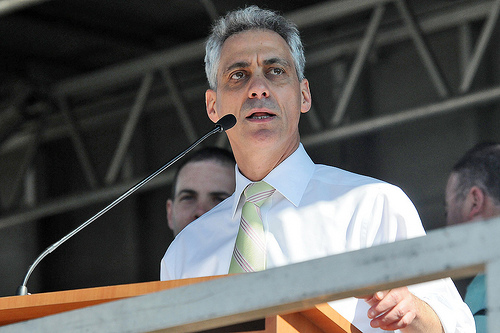It’s only too easy for a Canadian visitor — all right, a Toronto visitor — to go gaga in Chicago. Everybody knows why: the waterfront that remains a vibrant part of the city instead of secreted away behind an impenetrable wall of identical condos; the exciting skyscrapers instead of Toronto’s mediocre and banal ones; the commitment to preserve and repurpose splendid historic buildings.
And, like more privileged Chicagoans themselves, you have almost no idea what most of the city is really like. In reality, huge sections are little more than deprived ghettoes — this is where Barack Obama got his start as a social worker — which for some time have been in a little-known state of fight-back against the austerity-loving administration of Mayor Rahm Emanuel.
The world already knew Emanuel only too well, especially from his tenure as President Obama’s chief of staff, as a profane, abusive bully. Now, given his Wall Street millions, it’s little surprise that this high-profile Democrat has proved to be just another conventional neocon politician, ready to solve his city’s problems on the backs of its most neglected citizens.
I said that many tourists would almost be unaware that the other Chicago even existed. The “almost” is this: You’d have to be wilfully blind not to see the homeless, unemployed and destitute who inhabit every single block of the city’s famed downtown, its tourist mecca, the Magnificent Mile. Most blocks — and they’re very short — count two of them. You might say those you find on the golden mile are the representatives both of the city’s thousands of homeless souls and of the other Chicago in general.
Of course Canadian cities have few bragging rights when it comes to our own homeless problem and to the presence of street people. So it’s not Chicago’s down-and-out who unnerve you. No, the real shocker is this: the presence on those lush streets of actual families slumped on a piece of cardboard, in the course of a few chic blocks three adults — two women and one man, two black and one white — each surrounded by several kids, hoping for street charity and getting precious little of it.
It’s a sight only too common on the streets of Addis Ababa and Delhi, as I can sadly attest. But Chicago, Sinatra’s toddling town? It’s a spectacle I’ve never seen anywhere else in the entire rich world, certainly not in Toronto or elsewhere in Canada. We could hardly believe our eyes.
Is it surprising, given America’s mood, that the victims are largely blamed for their own situation? As a recent poll only too typically found, the main reason for America’s continuing poverty crisis is believed to be “too much welfare that prevents initiative.”
Must I state that this is simply false? But the sentiment, I’m afraid, reflects a disturbing larger truth about the United States. As New York Times columnist Charles Blow wrote only last weekend, “Today’s America…is insular, cruel and uncaring.” Just last month in Washington, for example, the Republican-controlled House of Representatives passed a farm bill that entirely left out the country’s huge food stamp program. Yet an unprecedented 50 million Americans depend on food stamps.
Blow pulls no punches in blaming the Republican party, which has “all but abandoned the idea of compassionate conservatism and are diving headlong into callous conservatism.” Surely it’s reached the bottom! Yet what’s worse, the party may well accurately represent what many Americans believe about poor and black people, categories that are often (and not always incorrectly) conflated. From Columbia law professor Patricia Williams we learn of the empirical tests showing “the degree to which Americans still associate dark skin with negative attributes such as ugliness, stupidity and danger.”
And Princeton’s Susan Fiske reports that “The stereotypes of poor people in the United States are among the most negative prejudices that we have. People basically view homeless people [in particular] as having no redeeming qualities — there’s not the competence for anything, not having good intentions and not being trustworthy.”
As Prof. Fiske puts it: “It seems like Washington is a place without pity right now. A town without pity.”
Pity, or simple concern for fellow citizens, are in pretty short supply at every level of government in the United States today, regardless of party. Besides Democrat Rahm Emanuel’s attack on Chicago’s least privileged, Illinois’ Democratic Governor Pat Quinn has cut the state budget so drastically that hundreds of thousands of the poor and elderly have been removed from public health programs.
I wish Toronto had Chicago’s architecture, its shoreline and the Bean. The rest they can keep with my blessing. As in the U.S., Canada has quite enough of our own callous conservatives eager to make us too a country without pity, one that’s insular, cruel and uncaring. Our great challenge is precisely to stop them from succeeding.
Photo: flickr/ocpa_mw



